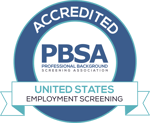
Employers should avoid a few mistakes in order to maintain compliance when hiring and background screening applicants. We’ve highlighted a few of those mistakes here.
Not Obtaining Consent
Prior to running a background check, you must have permissible purpose, you must notify the applicant of intent, and you must obtain consent. Does your consent form contain the required forms and summary of rights (see below)? Does your CRA offer a compliant online consent form?
Not Providing Compliant Disclosures and Authorizations
Ensure you are using the most current and up-to-date disclosures and authorizations. These can be accessed within the Choice Screening online consent form process. If you are not using our online consent form process, please reach out to your account manager to ensure your consent is current and updated.
Read more: Summary of Rights Notice Blog
Not Following Adverse Action
Whenever an employer uses a background check to make a decision that is not in favor of the applicant, the employer is taking Adverse Action and must follow certain rules to maintain compliance.
Please note: depending on where you operate or where your applicant resides, you may be required to meet local Adverse Action regulation, such as the New York City Fair Chance Act Notice. Local laws may require employers to make a conditional offer of employment before conducting a background check, which you will need to factor in to your Adverse Action Policy.
The FCRA outlines the requirements for taking adverse action to accomplish three primary goals:
- Inform the applicant of their rights under the FCRA
- Ensure the applicant knows adverse action was taken based all or in part on the results of a background report
- Allow the applicant to review the background report and dispute any inaccuracies.
Inherent in the adverse action process is giving the applicant the ability to correct inaccurate or incomplete information that could influence your decision to continue with an offer of employment. This is the most important goal of adverse action, offering protection for the employer and the subject of the background report.
Not Maintaining Consistency
FCRA Compliance requires that employers are consistent when conducting background checks. There are three areas you should consider when evaluating consistency.
Background check for the position, not the individual - Are you performing background checks based on the position and not on the individual? Perform the same background checks for every applicant interviewing for that particular job. If you run alias names on female applicants, you must also run alias names on male applicants. Evaluate you current processes to determine if are consistent in your background checks.
Equal and Non-Discriminatory Drug Testing - Mandatory employee drug and alcohol screening must be non-discriminatory and equal for all employees. Does your drug and alcohol screening policy clearly outline enforcement? Are you consistent with types of drug and alcohol screening events such as:
- Pre-employment
- Post Accident
- Reasonable Suspicion
- Random Retention
- Annual Retention
Uniform paperwork and processes - Clear and concise processes are almost important as the search itself. Processes must be consistent for each employee or applicant. Is your process non-discriminatory? Is your paperwork without errors? (This is very important with Form I-9)
Not Complying to the “Bans”
Ban-The-Box: requires that an employer may not use a criminal conviction history of a potential applicant until a conditional offer of employment has been presented to the applicant. This includes prohibiting the “box” on a job application which asks whether the applicant has been convicted of a crime.
Salary History Ban: prohibits employers from inquiring about an applicant’s salary history or using salary history to assign compensation.
Not Verifying Employees Correctly
Is your employee completing Section 1 of Form I-9 on the first day of employment? Is the employee providing documents by the 3rdday of employment? Are you completing Section 2 of Form I-9 by the 3rd day of employment? Not following timelines for Form I-9 can result in audits and fines.
As a consumer reporting agency, we cannot act as your attorney or give you advice. This blog is informative and not all-encompassing. It is not meant to provide legal advice. You must consult qualified legal counsel to ensure you are maintaining a compliant background screening program.


